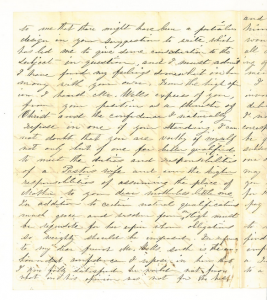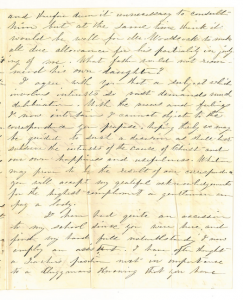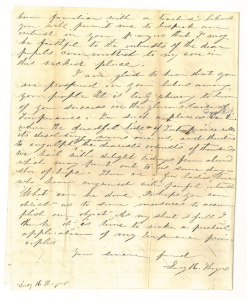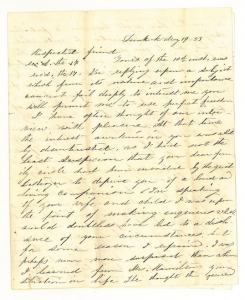Author: Lucy H. Thayer
Recipient: Henry E. Woodcock
Date: 19 May 1853
Location: Henry Edwin Woodcock Papers, Record Group 30/81, Series 1. Correspondence, Oberlin College Archives
Document Type: Autograph Letter, Signed by Author.
Introduction:
This next letter is Lucy Thayer’s reply to Henry Woodcock’s proposal of correspondence. Like Henry’s, her writing reveals societal expectations about women’s role and importance in the home; however, her letter also indicates that antebellum society was starting to accept more diverse roles for women. Like increasingly larger numbers of women, Lucy Thayer was educated and a qualified teacher. Though this position was only intended to last until her marriage, it does hint at a society that was beginning to accept both educated women and unmarried women in the workforce.
In the final paragraph, Lucy discusses her involvement in the temperance movement. Like abolition, temperance was one of the earliest political issues in which women were popularly allowed to have interest, and served as a training ground for future suffragists in organization and campaigning. Lucy Thayer’s involvement in temperance work reveals not only her own moral principles, but also reflects the growing number of women who began to raise their own voices in support of causes they believed in, rather than allowing men to speak for them.
Respected friend
rec’ d. the 17 Yours of the 10th inst. was rec’d. the 17. I’m replying upon a subject which from its nature and importance cannot fail deeply to interest me you will permit me to use perfect freedom.
I have often thought of our interview with pleasure. At that time the interest awakened in you _ was wholly disinterested, as I had not the least suspicion that your dear family circle had been invaded by the guest Destroyer to deprive you of a loved and loving companion. In speaking of your wife and child, I was upon the point of making enquiries which would  doubtless have led to a disclosure of your circumstances, but for some reason I refrained. I was perhaps never more surprised than when I learned from Mrs. Hamilton your situation in life. The thought then occurred to me that there might have been a particular design in your suggestion to write, which has led me to give some consideration_ [sic] to the subject in question, and I must admit I have found my feelings somewhat in harmony with your own. From the high opinion I heard Mr. Wells express of you, from your position as a lMinister [sic] of Christ and the confidence I naturally repose in one of your standing, I cannot doubt that you are worthy of myself not only but of one far better qualified to meet the duties and responsibilities of a Pastor’s wife and even the higher
doubtless have led to a disclosure of your circumstances, but for some reason I refrained. I was perhaps never more surprised than when I learned from Mrs. Hamilton your situation in life. The thought then occurred to me that there might have been a particular design in your suggestion to write, which has led me to give some consideration_ [sic] to the subject in question, and I must admit I have found my feelings somewhat in harmony with your own. From the high opinion I heard Mr. Wells express of you, from your position as a lMinister [sic] of Christ and the confidence I naturally repose in one of your standing, I cannot doubt that you are worthy of myself not only but of one far better qualified to meet the duties and responsibilities of a Pastor’s wife and even the higher  responsibilities of assuming the place of Mother, to your dear motherless little one. In addition to certain natural qualifications much grace and wisdom from [added above the line: on] High must be requisite for her upon whom obligations so weighty should be imposed. In reference to my dear friend Mr. Wells such is the unbounded confidence I repose in him that I am fully satisfied he would not favor what in his opinion was not for the best and therefore deem it unnecessary to consult him, but at the same time think it would be well for Mr. Woodcock to make all due allowance for his partiality in judging of me. What father would not recommend his own daughter?
responsibilities of assuming the place of Mother, to your dear motherless little one. In addition to certain natural qualifications much grace and wisdom from [added above the line: on] High must be requisite for her upon whom obligations so weighty should be imposed. In reference to my dear friend Mr. Wells such is the unbounded confidence I repose in him that I am fully satisfied he would not favor what in his opinion was not for the best and therefore deem it unnecessary to consult him, but at the same time think it would be well for Mr. Woodcock to make all due allowance for his partiality in judging of me. What father would not recommend his own daughter?
I agree with you _ [sic] that a subject which involves interests  so vast demands much deliberation. With the views and feelings I now intertain [entertain] I cannot object to the correspondence you propose, hoping thereby we may be guided to such a decision as shall best subserve the interests of the cause of Christ and our own happiness and usefulness. Whatever may prove to be the result of our corresponden ce [sic] you will accept my grateful acknowledgements for the highest compliment a gentleman can pay a lady.
so vast demands much deliberation. With the views and feelings I now intertain [entertain] I cannot object to the correspondence you propose, hoping thereby we may be guided to such a decision as shall best subserve the interests of the cause of Christ and our own happiness and usefulness. Whatever may prove to be the result of our corresponden ce [sic] you will accept my grateful acknowledgements for the highest compliment a gentleman can pay a lady.
I have had quite an accession to my school since you were here, and find my hands full, notwithstanding I now employ an assistant. I have often thought a Teacher’s position next in importance to a Clergyman’s. Knowing that you have been familiar with a teacher’s labors you will permit me to bespeak an interest in your prayers that I may be faithful to the interests of the dear pupils committed to my care in this wicked place.
I am glad to hear that you are prospered in your labors among your people. It is truly cheering to learn of your success in the glorious cause of Temperance. In such a place as Dunk. where the dreadful tide of Intemperance rolls its desolating waves over us, and threatens to engulf [added above line: forever] the dearests interests of thousands, we hail with delight tidings from abroad which may point out to us some day star of hope. There are [torn, a?] few ladies here who have enquired with painful interest. What can be done. Perhaps you can direct us to some measures to accomplish our object. As my sheet is full I think it is time to make a practical application of my temperance principles
Your sincere friend
Lucy H. Thayer
Lucy H Thayer
Transcribed by Rachel Sacks.
1These errors occurred when Lucy Thayer accidentally began writing on the same line as her indented first sentence, rather than on the line below.
2Mrs. Hamilton is possibly the wife of the minister who married Henry and Lucy (Oberlin College Archives, Henry Edwin Woodcock Collection).
3Lucy’s adoptive father.
4During Henry’s years at Oberlin he often took teaching positions over the school breaks, as did his sister Lucy. In his autobiography, he mentions that they generally tried to teach in nearby schools so that they could still see each other regularly (Oberlin College Archives, Henry Edwin Woodcock Collection).
5Dunkirk, New York.
6Though there were local temperance movements and legislation in New York at this time, the state’s version of the Maine Law, which prohibited the sale of liquor on a statewide level and included provisions for effective enforcement, would not pass until two years later. Judging from Lucy’s consternation, it seems likely that Dunkirk was not a city that had effective local temperance laws. (Ian R. Tyrrell, Sobering Up :From Temperance to Prohibition in Antebellum America, 1800-1860. Contributions in American History ; no. 82. Westport, Conn.: Greenwood Press, 1979, p. 256).
7This reference to the “painful interest” of a some women in the temperance movement, calls up the specter of domestic abuse that was often correlated with alcohol during this period. It was this connection between the destruction of the home and alcoholism that allowed women to become involved in the temperance movement without moving drastically outside of the traditional woman’s sphere. Like abolition, the fact that women could connect their traditional realm of morality and the home, to a cause with distinctly political applications helped women step into the political arena, and prepared the way for the extremely politically oriented feminist movements of the early twentieth century (Carol Lasser and Stacey M. Robertson. Antebellum Women: Public, Private, Partisan. American Controversies Series. Lanham: Rowman & Littlefield Publishers, 2010).
